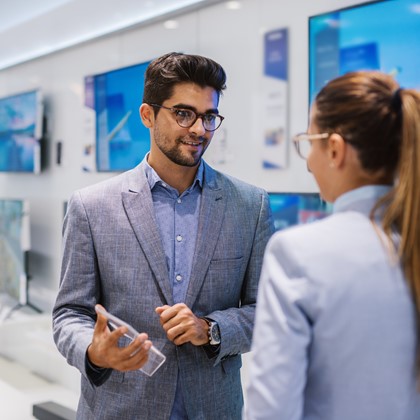The key to high value sales in retail: LG vs Samsung
17 August 2023
Author: Linzi McGuire
4 ways to increase recommendation rates in store...
Does the impact of your field training team really influence recommendation rates in stores? In this piece we’ll explore data from a recent audit to understand how and if the two correlate.
Using our crowd partner, Shepper, we explored 108 stores across the country to test brand recommendation rates. For this study, we chose the TV market where we could give an unbiased view.
The TV category is known to be ultra-competitive, in both technology and price. It’s also a category with historically high investment in field teams. For the purposes of this study we compared whether LG and Samsungs field investment, the two largest players in this market, was having an impact in stores.
Over the course of the study, there were four key findings of huge interest:

1. Recommendation rates
While LG recommendation rates were 11% higher overall across the full estate (50% vs 39%), Samsung had the highest recommendation rates in the top performing stores. The data also deduced that in more mature and premium stores like John Lewis, both brands achieved the exact same recommendation rate at 40%.
2. Why retail colleagues recommending the brands
The main reason for LGs recommendation was the OLED technology, not the brand. There was also big concentration on attach – packaging soundbars into the sale put a few of our panel off purchasing. Surprisingly, the main reason for Samsung recommendations was overall screen quality, which suggested that retail colleagues had a better understanding of the Samsung range, and their overall brand perception of Samsung was higher than competitor brands.
3. Reasons for not recommending a brand
When we examined reasons for not recommending after being prompted, it’s clear that LG have an issue. Data showed that retail colleagues perceive LG TVs as having poor screen technology as this was the main reason for not recommending the brand.
4. Can store staff demo a product and is this important?
Demonstrations are a key part of store experience, particularly when buying high value or technology products. However, 40% of our mystery shoppers were not offered a demonstration on LG TVs. Of those who did offer a demonstration, 70% retail colleagues considered LG better than other brands. Of those who did not offer a demo, only 38% considered LG the best brand in the category.
Having run field teams for decades, and having worked in the technology sector for over a decade, we know that training strategies delivered by the field team to the retail staff majorly impact recommendation rates and sales in store.
Our top tip to brands who need to increase their recommendation rates are to get a great training strategy in place, then follow these four steps to success:
1.Make sure your coverage plan is balanced. If you are playing the conversion and recommendation game, you need to be winning in the largest stores, and those retailers that bring in a unique customer, like John Lewis.
2. Decide which brand message will convert customers and focus on these when training staff. Customers can research best prices themselves, but brand connection messages like investment in R&D, ease of use of platform, and unique features can win over customers in store and move the conversation away from price.
3. If you brand has legacy issues with quality, customer service, or recalls, you must include this in your training strategy to reverse and combat these perceptions. Negative experience spreads five times as fast as a positive one, so you need to get on top of these areas to make sure retail staff can answer these questions competently.
4. Product demonstrations increases conversion likelihood hugely. Train retail staff on how to demo the product to a customer in addition to being able to hold a conversation about it. Not training staff how to demo the product is a huge miss for many teams. In order to win sales, you need retail staff to be confident and hands on with the product.
So, does the impact of your field sales training team really have influence recommendation rates? Based on our experience, we’d say it’s a resounding yes.